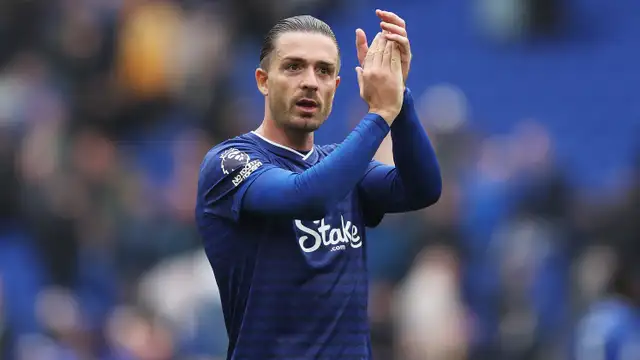
In the electric glow of Goodison Park’s floodlights—soon to be eclipsed by the gleaming new Hill Dickinson Stadium—Jack Grealish has rediscovered the joy that first made him England’s darling. The 30-year-old winger, once the £100 million poster boy of Manchester City’s global dynasty, has ignited Everton’s early-season surge with four assists in just five Premier League outings, a statistic that leads the league and whispers of a career reboot. Loaned to the Toffees from City in a move laced with redemption, Grealish’s transformation isn’t just about assists or audacious dribbles; it’s a raw, unfiltered reckoning with his off-pitch indulgences, the suffocating weight of Pep Guardiola’s expectations, and the liberating embrace of a club that feels like home. “People go, ‘he likes to go out, he likes to party,’ and I do,” Grealish confessed in a candid sit-down with former manager Tim Sherwood, his voice carrying the weight of a man finally unburdened. “I want to be able to live my life and enjoy myself but obviously there’s a time and a place to do that.”
The narrative of Grealish’s City tenure reads like a cautionary tale of excess meeting elite demands. Arriving from Aston Villa in 2021 amid fanfare and fireworks, he dazzled in that treble-winning 2022-23 campaign, his mazy runs and infectious energy key to lifting the Premier League, Champions League, and FA Cup. But the shine faded fast. Injuries sidelined him for chunks of the following season, and when fit, he started just 10 league games, often benched as Guardiola’s tactical machine prioritized relentless pressing over Grealish’s flair. The Spaniard, ever the perfectionist, didn’t mince words: “I want Jack from the treble season,” became a refrain in pressers, a subtle indictment of the player’s waning edge. Whispers grew louder—late nights in Manchester’s nightlife, high-profile spats, and a perceived dip in discipline—that Grealish’s party-boy persona was eroding his edge. He owns it now, with brutal honesty: “Sometimes at City, for example, I didn’t help myself at times, I’ll openly say that – but then I don’t think it was all down to that.” It was a perfect storm: the system’s unyielding conformity clashing with his free-spirited soul, leaving him toiling alone at Bodymoor Heath as the sun set on his Etihad dreams.
By summer 2025, the writing was on the wall. Omitted from City’s squad for the FIFA Club World Cup after a final-day benching against Fulham, Grealish knew his time was up. Everton, a club he’d long admired for its raw passion and Merseyside grit, swooped in with a season-long loan—£50 million option to buy attached—that felt less like exile and more like escape. David Moyes, the no-nonsense Scot who’s steered the Toffees through storms before, saw untapped potential in the man he’d once eyed at Villa. “I know Jack’s ambition is to get back into the England squad, so hopefully we can help him achieve that over the course of the season,” Moyes said upon sealing the deal, his faith a balm for Grealish’s bruised ego. From day one, the fit was seamless. Deployed in his natural No. 10 role rather than City’s wide-left straitjacket, Grealish has been a revelation: leading the league in fouls won and total carries, his close control drawing defenders like moths to a flame. Everton sit a comfortable 12th after five games, with two wins under their belt, and Grealish’s fingerprints are everywhere—from a pinpoint assist in the opener against Brighton to a cheeky through-ball that unlocked Arsenal’s defense.
What sets this revival apart isn’t just the stats; it’s the emotional thaw. Grealish, who faced raised eyebrows for choosing Everton over flashier suitors, has leaned into the love affair. “Everton is a massive club,” he shot back at doubters, his Scouse-inflected pride shining through. Under Moyes, he’s rediscovered the freedom to express himself—no more Guardiola’s “obedient little schoolboy,” as one observer quipped, but a player unleashed. Training sessions buzz with his laughter, matches with his swagger; he’s even joked about channeling Wayne Rooney and Paul Gascoigne, Everton icons whose flair mirrored his own. The partying? It’s still there, a thread in his tapestry, but tempered by maturity. “I didn’t help myself at times,” he admitted, recalling a teenage dressing-down from Sherwood after a bleary-eyed session. Yet, he refuses to let it define his exit. “It wasn’t all down to that,” he insisted, pointing instead to the soul-crushing conformity of City’s machine. At Everton, the supporters chant his name like a prodigal son, the manager grants leeway, and the pitch feels like playground again.
As Monday night’s clash with West Ham looms—Nuno Espirito Santo’s Hammers reeling from Graham Potter’s midweek sacking—Grealish eyes the horizon with renewed fire. The fixture, at the state-of-the-art Hill Dickinson, promises fireworks: West Ham’s chaos against Everton’s budding cohesion, with Grealish at the creative fulcrum. Beyond club form, international redemption beckons; Gareth Southgate’s successor will surely note his assists haul when picking for Nations League duty. Grealish’s story, once a tabloid staple of glitz and gaffes, now hums with hope—a third act where the party-loving lad from Solihull proves he’s more than his headlines. In a league of mercenaries and machines, his Everton odyssey reminds us: sometimes, thriving means finding a place that loves you back, flaws and all. As he dribbles past markers and threads needles for teammates, Grealish isn’t just assisting—he’s authoring his own comeback symphony, one audacious step at a time.
Leave a Reply